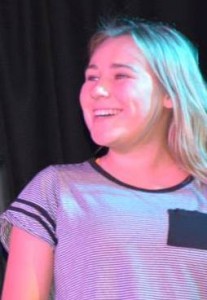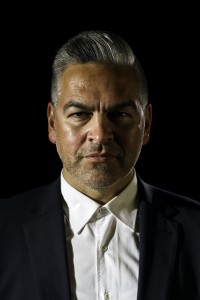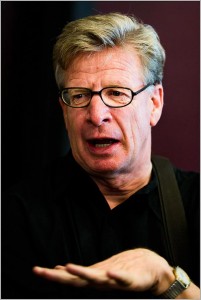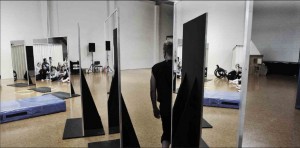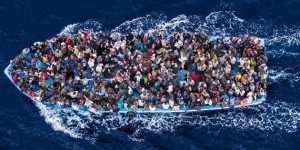Madam Black, a short film written by Matthew Harris, one of our senior tutors in Auckland, has recently picked up Best Short Film at The Rialto Channel NZ Film Awards (the ‘Moas’). The film has now won 38 international awards, including the Prix du Public at the Clermont-Ferrand in France – the biggest audience prize for short film in the world. After this weekend’s win the film was described by Rialto as a “globally acclaimed short” on an “historic awards run”. Matthew says “the volume of these festival awards are definitely encouraging, so I’ll be devoting a lot more time to screenwriting, but I maintain other areas of interest too – short fiction, academic writing, teaching – I’m looking forward to tutoring Creative Writing this semester!”
Category Archives: Subject
Clermont-Ferrand short film festival winner
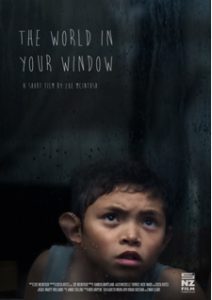 Big congratulations to our Wellington media production lecturer Costa Botes and his longstanding mentee Zoe McIntosh who have won a coveted prize in the 2017 Clermont-Ferrand short film festival in France. The festival is the biggest event of its type in the world. It’s a feat just to get selected for competition, then Zoe and Costa’s film The World in Your Window has picked up the Student Prize in the international competition – this is an award given by an international student jury. The jurors described the film as “a real visual poem”. The jury announcement said “we were all touched by the relationship you depicted between a dad and his son. The breath of humanism and tolerance that emerges from your film is extremely moving.” The World in Your Window is directed by Zoe McIntosh, written by Costa Botes and Zoe McIntosh, and produced by Hamish Mortland. It will have its New Zealand premiere at the New Zealand International Film Festival mid year.
Big congratulations to our Wellington media production lecturer Costa Botes and his longstanding mentee Zoe McIntosh who have won a coveted prize in the 2017 Clermont-Ferrand short film festival in France. The festival is the biggest event of its type in the world. It’s a feat just to get selected for competition, then Zoe and Costa’s film The World in Your Window has picked up the Student Prize in the international competition – this is an award given by an international student jury. The jurors described the film as “a real visual poem”. The jury announcement said “we were all touched by the relationship you depicted between a dad and his son. The breath of humanism and tolerance that emerges from your film is extremely moving.” The World in Your Window is directed by Zoe McIntosh, written by Costa Botes and Zoe McIntosh, and produced by Hamish Mortland. It will have its New Zealand premiere at the New Zealand International Film Festival mid year.
Shakespeare in Schools
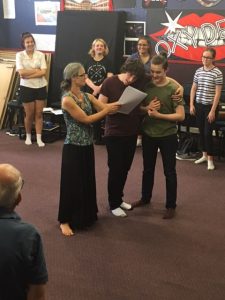 Don’t miss this year’s amazing Summer Shakespeare production of “The Winter’s Tale” directed by Sara Brody, which begins on March 2nd, 3rd, 4th, 9th, 10th and 11th at 7.30 pm at Victoria Esplanade, Palmerston North. As part of our Shakespeare in Schools Project run by our School in Manawatu, Sara worked with drama students at Freyberg High School on Tuesday during a workshop on “The Winter’s Tale”.
Don’t miss this year’s amazing Summer Shakespeare production of “The Winter’s Tale” directed by Sara Brody, which begins on March 2nd, 3rd, 4th, 9th, 10th and 11th at 7.30 pm at Victoria Esplanade, Palmerston North. As part of our Shakespeare in Schools Project run by our School in Manawatu, Sara worked with drama students at Freyberg High School on Tuesday during a workshop on “The Winter’s Tale”.
“Lifetime” achievement
Public Plenary Lecture – Celeste Langan
Celeste Langan, Associate Professor in the UC Berkeley Department of English, will be speaking in Wellington at the upcoming RSAA conference “Transporting Romanticism” on Friday 17 February. Details are below:
Under Arrest: Transport and Security (Excitation and Citation)
Friday 17 February 2017
4.45pmpm
The Pit 12B09 – Te Ara Hihiko, Massey Wellington
Recent books on the modern revolution in transport enabled by the shipping container remind us that the term “logistics,” now used primarily to signify systems “allowing circulations to take place,” was first used by one of Napoleon’s former generals: a chapter in Jomini’s The Art of War was titled “Logistics; or the Practical Art of Moving Armies.” How might we think of what is after all the continuing project of “transporting Romanticism” in relation to global logistics and the shipping container? Reminded that books of poems are carried on the same ships that transport settlers and soldiers, what changes about our understanding of their power to transport? Recognizing the press as an “information delivery system,” how can we differentiate between the “hackney’d” phrase Byron identifies with cant and those “truths” that “must be recited,” truths “you will not read in the gazette?” Focusing on the quotation and the capsule as figures of containerized movement in Byron’s Don Juan and Kleist’s Michael Kohlhaas, I’ll explore their attempts to develop a counterlogistics of the word.
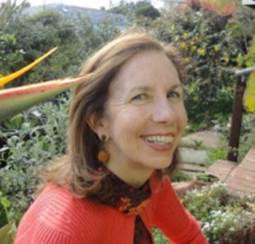 Celeste Langan, Associate Professor in the UC Berkeley Department of English, is the author of Romantic Vagrancy: Wordsworth and the Simulation of Freedom, a study of why and how Rousseau and Wordsworth represent political freedom as freedom of movement. More recently, she has helped to develop the subfield of Romantic Media Studies, with essays like “Understanding Media in 1805,” “The Medium of Romantic Poetry” (co-authored with Maureen McLane), and “Pathologies of Communication from Coleridge to Schreber.” Her current book manuscript, Post-Napoleonism: Literature and the Afterlife of Sovereignty, traces the migration of the political concept of sovereignty into the domain of the literature. Drawing on the Freudian concept of “afterwardsness” or the après coup, the book illuminates ways in which the newspaper report of an event is foundational to a new idea of literature as mediated utterance.
Celeste Langan, Associate Professor in the UC Berkeley Department of English, is the author of Romantic Vagrancy: Wordsworth and the Simulation of Freedom, a study of why and how Rousseau and Wordsworth represent political freedom as freedom of movement. More recently, she has helped to develop the subfield of Romantic Media Studies, with essays like “Understanding Media in 1805,” “The Medium of Romantic Poetry” (co-authored with Maureen McLane), and “Pathologies of Communication from Coleridge to Schreber.” Her current book manuscript, Post-Napoleonism: Literature and the Afterlife of Sovereignty, traces the migration of the political concept of sovereignty into the domain of the literature. Drawing on the Freudian concept of “afterwardsness” or the après coup, the book illuminates ways in which the newspaper report of an event is foundational to a new idea of literature as mediated utterance.
This plenary is made possible by the W.H. Oliver Humanities Research Academy, Massey University. It forms part of Transporting Romanticism, Romantic Studies Association of Australasia Biennial Conference, 16-18 February 2017, co-hosted by Massey University and Victoria University of Wellington. https://rsaa2017.wordpress.com/
Manawatu River becomes a Shakespearean backdrop
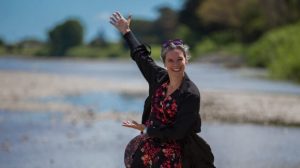 Director Sara Brodie is bringing a bit of wild to Summer Shakespeare 2017, with the Manawatu River as a backdrop and all sorts of surprises planned.
Director Sara Brodie is bringing a bit of wild to Summer Shakespeare 2017, with the Manawatu River as a backdrop and all sorts of surprises planned.
In her position as the artist in residence at Massey University, the Kapiti-based director and choreographer has chosen The Winter’s Tale as her play.
“It’s comic and tragic and I want to evoke a winter’s night and the fantastic tale element of it as much as possible.”
A stretch of Palmerston North’s Esplanade river walkway will be the stage for the open theatre piece, and Brodie said all sorts of things become possible in such a setting.
“When the audience actually come along here it will all be set up like a mid-winter fair with braziers, bunting, food stories and fire poi. We enter into the court scenes first where the jealous ravings of King Leontes start.”
Brodie is no stranger to staging outdoor events and said the “happy accidents” that occur are one of the best elements.
“Beautiful sunsets or wind at just the right moment. Those sort of things that really add to the experience for people. This will be like going into the fantastical wilds.”
The annual event is in it’s 14th year and will be drawing on Palmerston North’s non-professional theatre community for the production that will be held next March.
A workshop will be held at 10am on Saturday at Massey University’s Sir Geoffrey Peren Building, which Brodie said will give people an idea of the process.
“It’s for anyone who is interested to come along to meet me and to hear about the production and see some concept imagery around it. We will talk about the story and get our teeth into some of the text and some exercises to have some fun with it.”
Formal auditions for The Winter’s Tale will be held at the end of November and as well as actors and dancers, Brodie is also on the look out for production behind-the-scenes people.
Globe Theatre Awards – Massey’s nominations
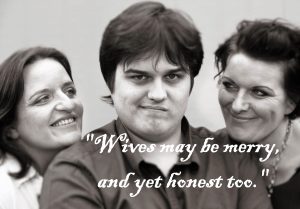 We are delighted with the nominations for the Globe Theatre Awards across four Massey University productions this year. Our student driven production, Arts Uncontrolled, received a nomination for best ensemble. MUDS (our drama society) received two nominations for Misfits, and Kelly Harris received a nomination for Best direction for our Summer Shakespeare production The Merry Wives of Windsor. Our third year course Modern Drama received three nominations for their production of Love and Information, directed by Rachel Lenart.
We are delighted with the nominations for the Globe Theatre Awards across four Massey University productions this year. Our student driven production, Arts Uncontrolled, received a nomination for best ensemble. MUDS (our drama society) received two nominations for Misfits, and Kelly Harris received a nomination for Best direction for our Summer Shakespeare production The Merry Wives of Windsor. Our third year course Modern Drama received three nominations for their production of Love and Information, directed by Rachel Lenart.
The winners will be announced during an awards ceremony at the Globe Theatre in Palmerston North on 24 February 2017.
Theatre with Massey has had an outstanding year in Palmerston North! Congratulations to all our nominees.
Congratulations Alice on Weta win!
A huge well done to Bachelor of Communication (Expressive Arts) student Alice Guerin for taking out a coveted Weta Digital prize for her documentary film about overfishing. Alice has won an Outlook for Someday award – a sustainability film competition open to young people under 25.
Alice has always had a passion for the environment and for creative activism (she volunteered in Climate Change Theatre Action her first year with us at Massey Wellington). And now after studying Documentary Film with acclaimed documentary filmmaker and School of English & Media Studies lecturer Costa Botes as part of her Bachelor of Communication major in Expressive Arts, she has achieved this fantastic success.
We are very proud of you Alice!
See more detail in this story on Stuff: http://ssl-www.stuff.co.nz/environment/87503410/Massey-student-wins-Weta-Digital-Award-for-documentary-on-overfishing
You can view Alice’s winning film at: https://vimeo.com/189142375
NUTS Newsletter #12
Editorial
Welcome to the twelfth edition of NUTS NZ – the Newsletter for University Theatre Studies New Zealand. The purpose of the newsletter is to help us communicate more effectively as a community of scholars interested in Theatre and Performance. We have an interesting selection of stories and items for you in our final issue for 2016. First up, we would like to remind you that this year’s National Examiners and NZ Universities Committee for Theatre/Performance Research meetings will be hosted by Otago University on Tuesday 15th November. There are also some important events coming up that you should note in your calendar. This includes the Auckland University’s symposium Accessible Arts: Practice and Barriers which is happening today – but is an important event we thought we should bring to your attention. Don’t forget that the University of Otago is hosting the interdisciplinary conference entitled ‘Performing precarity: Refugee representation, determination, and discourses’ from 21-23 November 2016. Should be an interesting event. Also, we’ve included some information on the ADSA conference next year which is entitled ‘Performing Belonging in the 21st Century’. The deadline for the ADSA conference is looming – abstracts are due in on Monday the 20th of November! There is also the Social Alternatives’ call for papers on ‘Issues on Performing, Community, and Intervention’. We also have information on Victoria University’s latest play – The Trojan Women – and a link to the review. In our last “NUTS People” segment for the year, we are profiling Victor Rodger and Stuart Hoar. We are not sure if we will be back again next year, but if we are, we will be looking for your support and contributions to make this newsletter work.
Kind regards,
NUTS NZ editors: Jane Marshall and Rand Hazou.
NUTS People
In each edition of NUTS NZ we profile an academic and a postgraduate student to show case “our people” and their current research/interests. In this issue we have Hilary Halba and Kiri Bell from The University of Otago. As always, NUTS NZ asked each of them to answer the following questions:
- What is your research about?
- What theatre/performances have you seen recently?
- What have you been reading lately?
Victor Rodger
This year my theatre entity, FCC, produced two plays: Puzzy by Hawaiian-Filipina writer Kiki – with additional material by myself – and Wild Dogs Under My Skirt by my cousin, Tusiata Avia. As this year’s Robert Burns Fellow at the University of Otago, I’ve worked on a few projects: Black Ice (a family drama), White Noise (an academic comedy), and I also worked on a cabaret called Christ(church) Almighty which will – hopefully – get on its feet in Christchurch next year.
I have recently read Girl on The Train and – most recently – Gone Girl. This is because I’ve been dabbling with the thriller form myself. Currently, I’m reading Eileen by Ottessa Moshfegh which was shortlisted for the Booker this year. After that, I’m going to read The Mandibles by Lionel Shriver whose controversial speech at the Brisbane Writers Festival certainly made me roll my eyes.
The most recent performance I saw was a show devised by two NASDA honours students, Asovale Luma and Shea Kouka, in Christchurch called Mai Slam. They used six local kids from Aranui and the show was a mixture of spoken word, song and skits. It was a work in progress and was certainly a bit rough around the edges but I came out of that show feeling like I’d had more fun watching that than just about anything else I’d seen this year. I also recently caught Not in Our Neighbourhood by Jamie McCallister. He’s my pick of the current writers in NZ for his ability to be able to write relevant, hard-hitting drama as well as well-crafted low-brow comedy.
Stuart Hoar
I’m currently rewriting a play about a drone pilot who meets a NZ woman. They have an affair but he neglects to tell her precisely what his job is. This play was written a year or two ago and has had a reading by ATC. I’m also trying to finish a novel I’ve been writing for a long time, only a few thousand words to go. I’m also researching for a new play I hope to start work on soon; this is a play about Michael Joseph Savage and Ned Kelly.
Books I have lately read are The Writers’ Festival by Stephanie Johnson, The Spy Who Came in from the Cold by John Le Carré, Attila the Hun by John Mann and a new play This I Know to be True by Andrew Bovell.
Plays I’ve been to recently include Billy Elliot, Call of the Sparrow, Retro Williams, The Protest, The Pink Hammer, Lucrece, Zen Dog Sartori, Shot Bro and A Ghost Tale.
Symposiums
Accessible Arts: Practice and Barriers
Friday 11th November 2016, 1.30-3.30pm
M2 Drama Studio, Faculty of Education and Social Work, University of Auckland, 74 Epsom Avenue
A half-day symposium for practitioners, researchers, students and disabled people who share an interest in disability arts and accessible arts practices. Presentations and discussions will focus on how participants might better achieve inclusive outcomes in schools, community settings and higher education.
Discussants:
Emma Bennison (via Skype) – CEO Arts Access Australia
Stuart Shepherd – Curator and Lecturer at Bay of Plenty Polytech, and Tutor at Mapura Studio
Margaret Feeney – Studio Coordinator and Arts Tutor, Mapura Arts Studio
Laura Haughey – Senior Lecturer in Theatre Studies, University of Waikato
Sue Cheesman – Senior Lecturer in Dance Education, University of Waikato, and tutor for Touch Compass
Chairs:
Rod Wills and Molly Mullen, School of Critical Studies in Education/Critical Research Unit in Applied Theatre
This event is free and includes afternoon tea.
Places are limited so please register via https://www.eventbrite.com/e/accessible-arts-practice-and-barriers-tickets-28926871050
For more information contact: m.mullen@auckland.ac.nz
Conferences
Performing precarity: Refugee representation, determination, and discourses
21-23 November 2016
The University of Otago, Dunedin,
Keynotes:
Professor Suvendrini Perera (Curtin University, Perth, Australia) & Professor Nikos Papastergiadis (University of Melbourne, Australia)
The current European refugee crisis continues to be a major focus of media attention as well as a point of political, cultural, ethical and social conflict. Images of migrants are constructed, mediated and circulated to create compelling representations of refugee-hood that serve a variety of agendas and conform to specific identities and expectations. They are, in this sense, performances. In addition, refugees in Europe and other regions, including Australasia, are subjected to detention and/or expected to perform/conform in certain ways to meet the shifting demands of determination processes and the cultural preferences of different regions. Once released from detention and/or recognised as refugees, another set of performances ensues – ‘welcome’ from the host country and ‘gratitude’ from the refugee. This interdisciplinary conference aims to draw together scholars from a wide variety of fields to examine the ethics and politics surrounding refugee representation, determination, and discourses.
ADSA: Performing Belonging in the 21st Century
27 – 30 June 2017
Auckland University of Technology, Auckland University, Massey University
KEY DATES: Monday 20 November 2016 – Abstracts Due and Monday 11 December 2016 – Notification of Acceptance
The Māori concept of tūrangawaewae suggests a place to stand, a homeland, a way of belonging. Belonging, like identity, is a matter of ongoing performance: on stages and in the streets, in community halls, clubs, sporting arenas, churches and parliaments. In ‘Belonging and the politics of belonging’ (Patterns of Prejudice 2006), Nira Yuval-Davis observes that ‘Belonging is about emotional attachment, about feeling “at home”’ (197), and later notes:
The politics of belonging includes also struggles around the determination of what is involved in belonging, in being a member of a community, and of what roles specific social locations and specific narratives of identity play in this. (205)
Belonging may be deeply felt, but it is also manifestly constructed and capitalised upon, a matter of collectivity and communality, of inclusion and also of exclusion. We make ourselves into an ‘us’ by marking others as ‘them’, say we are of this place and they are not. Belonging is thus also a matter of desire, as much of longing to be as it is of being per se. Echoing Zygmunt Bauman and Leonidas Donskis, who want to ‘rediscover the sense of belonging as a viable alternative to fragmentation, atomization, and the resulting loss of sensitivity’ (Moral Blindness 2013: 12), we invite participants to think out loud about the diverse ways that belonging can be seen to be performed, onstage and off in the 21st century.
Topics might include:
- Ritual, theatrical and everyday performances of belonging
- Indigenous performances of belonging
- Pasifika and Oceanic performances of belonging
- Postcolonial performances of belonging, and of longing to belong
- The construction and performance of belonging in the context of diaspora
- The performance of privilege as it sits next to the performance of belonging – especially in the postcolonial state
- The many ways belonging and its obverse, otherness, can be performed in relation to communities, to those who align as ethnic, or LGBTI, who are of varied abilities, or who identify as seniors or youth
- The tension between practitioners who ‘belong’ – in particular, Indigenous artists – and scholars who might not
- Belonging, place and site-specific performance
- Intermedial belonging
- The performance of belonging through social media
- Protest, performance interventions, and (de)constructions of belonging
- Performing citizenship, participation and belonging
- Asylum and refugee theatre, non-citizenship in performance and the staging of dis-placement
- Pedagogical performances of belonging
- Actor training, belonging to character and role, and inhabiting the performance space
Maximum 250 words.
Email abstracts to: belonging@aut.ac.nz
Join us on Facebook: https://www.facebook.com/search/top/?q=performing%20belonging%20adsa%202017
CONTACT
Dr Sharon Mazer
Associate Professor of Theatre & Performance Studies
Auckland University of Technology
CFPs
CALL FOR PAPERS: Social Alternatives: Issue on Performance, Community and Intervention
The concept of ‘intervention’ usually signals the arrival of an outsider or a group of outsiders seeking to enable some kind of change within an individual or a particular community. Alternatively, intervention can be understood as an interruption: an intercession, an attempt to disrupt the status quo and cause change. In theatre and performance for, with, or by communities, intervention can evoke the image of the well-meaning ‘expert’, someone who applies the processes of drama to help heal fractured communities, give voice to the voiceless, or empower participants to acknowledge their own oppression. While the act of intervention is often accompanied by good intentions, it raises numerous questions on an ethical front, in particular issues of power and the right to speak on someone else’s behalf. How can the concept of intervention in performance be theorised, problematized and alternatively articulated? How does intervention manifest in theatre for, with and by communities? How does an interruption in the status quo of a community impact that community?
Social Alternatives is seeking to extend the discussion on performance and intervention and welcomes a range of submissions exploring this theme. Opportunities to contribute involve: academic articles, short stories, poetry, scripts and commentaries. It is anticipated that responses to this theme will be wide, and may take the following points into consideration:
- Re-envisioning intervention as ‘joyful encounters’
- Verbatim theatre as intervention
- Performance and interventions in gender representation
- Intervening in the public space through performance
- Theorising strategies and acts of intervention in performance
- Community theatre intervention
- Prioritising process or product in performance intervention
- Theatre, therapy and social conflict
- Intervention as interruption
- The impact of intervention in/through performance
Abstract Due: 1st December 2016. Guidelines for Contributors can be found at: http://socialalternatives.com/contributions
Social Alternatives is an independent, quarterly refereed journal. It is committed to the principles of social justice, commenting on important social issues of current concern or public debate. We publish practical and theoretical articles on relevant topics, as well as reviews, short stories, poems, graphics, comment, and critique.
Direct enquiries and submissions for this issue to the guest editors:
Dr Natalie Lazaroo, School of Education and Professional Studies, Griffith University natalie.lazaroo@griffithuni.edu.au
Dr Sarah Peters, School of Arts and Communication, University of Southern QLD sarah.peters@usq.edu.au
Performances
Victoria University recently performed a new translation of The Trojan Women. See the performance details and link to a review by John Smythe below.
THE TROJAN WOMEN
By Euripides’
A New Translation by Simon Perris
Directed by Bronwyn Tweddle
Presented by THEA301 at Studio 77 Amphitheatre, 77 Fairlie Tce, Wellington
From 5 Oct 2016 to 9 Oct 2016
http://www.theatreview.org.nz/reviews/review.php?id=9640
New Degree Offerings
Victoria University are launching a new MFA degree in 2017 — scholarships are available! See the link below for further details.
http://www.victoria.ac.nz/news/2016/09/new-postgraduate-arts-degree-hones-creative-skills-for-job-market
New Homegrown Show Celebrates Palmy Arts Scene
A whirlwind of creators, performers, and poets have come together from Palmerston North’s fantastic creative scene in the unique new show Arts Uncontrolled.
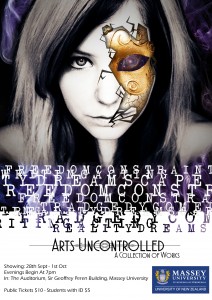 Featuring six plays, a short film and original poetry, all the pieces have been written by local artists from the Manawatu area. With everything from comedy to tragedy to surrealism, the team behind it have summarised it as ‘a celebration of our community’, with submissions from first time youth writers as well as award-winning professionals.
Featuring six plays, a short film and original poetry, all the pieces have been written by local artists from the Manawatu area. With everything from comedy to tragedy to surrealism, the team behind it have summarised it as ‘a celebration of our community’, with submissions from first time youth writers as well as award-winning professionals.
Artistic Director Tobias Lockhart says that the showcase came about specifically to offer a wider set of opportunities. “The performing arts scene in Palmerston North is so massive, it can be a little daunting. This showcase gives new and upcoming members of the community a chance to shine and become part of the larger scene. With both experienced and new members of the cast and crew, everyone can learn something from one another.”
“For the audience our focus is on making this showcase to be an experience – with something for everyone. Art is something you have to engage with, and our performance will have a range of genres and styles; some humorous, some dealing with more serious issues. By placing no limits on what could be included we opened it up so everyone watching will have something they connect with or enjoy.”
Arts Uncontrolled opens next Wednesday 28th September and runs for four shows. Held in Massey University’s Sir Geoffery Peren Building’s Auditorium, doors will open from 7pm, with a selection of poetry and art to be viewed in the space before the show begins at 7:30 pm.
Tickets: Full $10.00, Students with ID $5.00
Dates: Wednesday 28th September – Saturday 1st October
Time: Space opens 7pm, show begins 7.30pm
Venue: Sir Geoffrey Peren Building, Massey University, Tiritea Road, Palmerston North
Bookings: Email t.lockhart@live.com
